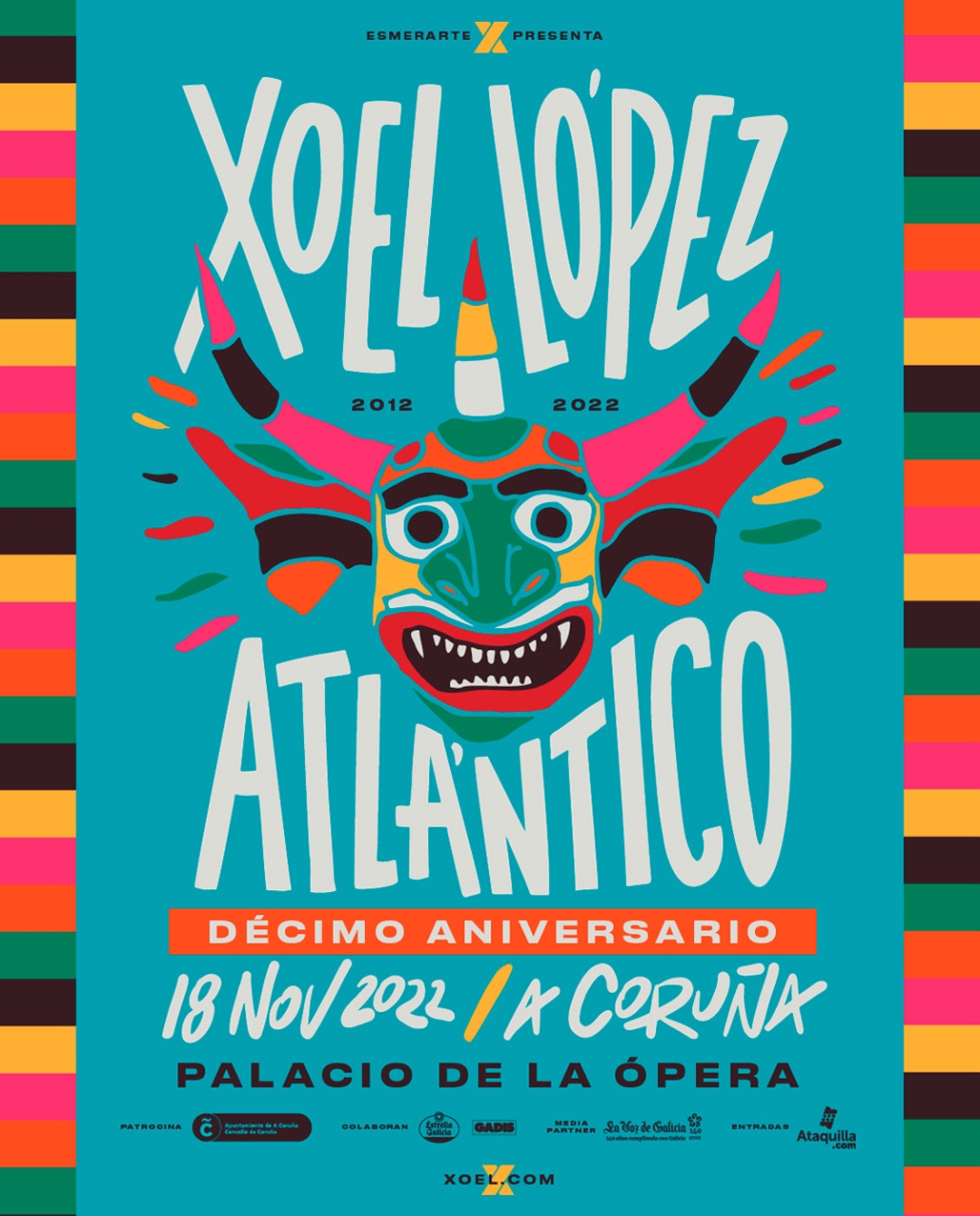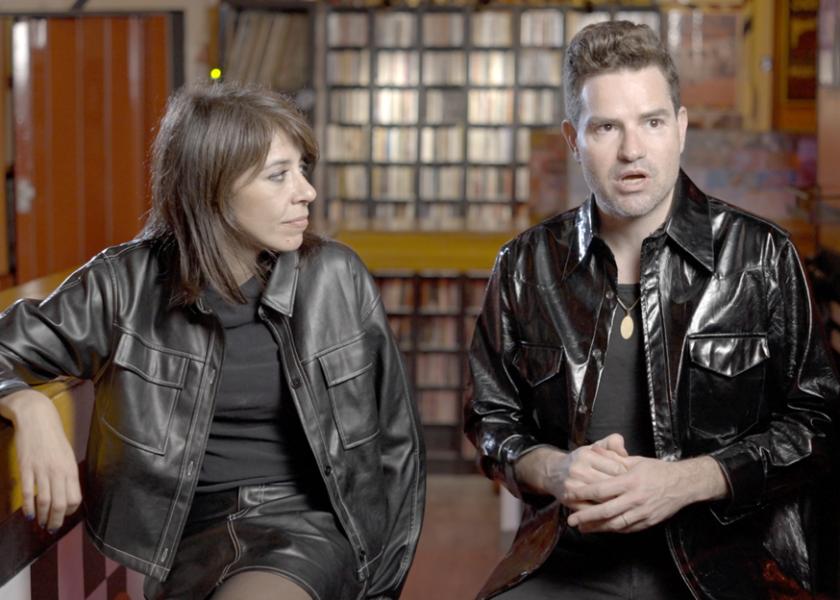Xoel López
A man of all places

"The moon looks a different face on this side of the world / And the people look a different shade on this side of the sea". Xoel López had to travel far, really far, to find himself again. The result of this three-year journey was ‘Atlántico’, an album that few understood but that today, coinciding with its tenth anniversary, stands unscathed. And its author, at his best, declares himself a man of the world.
On the 17th of April 2012, after leaving Deluxe behind, Xoel López (A Coruña, 1977), released new album: Atlántico. The reception of that work, which moved away from the sound that was typical of him until then, was mixed. Journalist Javier Becerra, in the book Atlántico. El disco de la liberación de Xoel López, remembers the cry uttered by the audience during the presentation at Riazor: “This sounds like Juan Luis Guerra!” And, in this case, that comment wasn’t meant as praise. Over the years, Atlántico found the place it deserved and, on the occasion of its tenth anniversary, we chat to the author. Since we’re going to go over his career, we suggest a game —including concepts in the titles of his songs in the questions— which he accepts gladly.
Before releasing Atlántico, your first album as Xoel López, you spent three years far from home. What pushed you to take this decision?
The answer is complicated because there were lots of reasons, and with time, I’ve rediscovered others. Basically, I felt like I needed a change related to my art. I fancied developing my work somewhere else, far from the ears of my audience and with the freedom travel gives you. Suddenly, you can do whatever you want. I could also only do it then, not now that my life is so different. It has been my biggest life adventure to date.
Your stay abroad brought a breath of fresh air to your music; what influences did you bring back in your suitcase?
I found many things: people, landscapes, and rhythms that I added to my life and my music, and that transformed me into a new version of myself. Strolling around Buenos Aires and buying a book about tango that you read in his streets, or listening to music from Rio De Janeiro while you experience its temperatures, scents, food… Is a completely different experience. Discovering the essence of music from other places was key. I brought back freedom, improvement, and a new vision.
As we’ve been saying, do you feel like a man from nowhere, or as a good Galician, is homesickness always present?
I’ll answer in the Galician way (laughs). Homesickness is always there, I can’t help it, but I play a lot of basketball and there’s a movement called pivot which represents how I feel. I have one foot in the place I belong to, where I was born and raised, but the other is constantly moving. So, contrary to the song, I feel more like a man of all places. I feel like the more places I’ve gotten to know, the more I love them. Discovering is loving, and loving is feeling part of something, so right now I’m something more complex than a guy born in A Coruña.
“Discovering is loving, and loving is feeling part of something, so right now I’m something more complex than a guy born in A Coruña”
Some people didn’t understand Atlántico at the time. During that period, did you learn how to avoid bullets in the form of criticism?
Yes. I also understood that they were inevitable. I believe that criticism is necessary and constructive, but there’ll always be someone who tries to hurt you with an aggressive comment. Luckily, I haven’t received many of them and when you reach a certain age, you learn to grant them the importance they deserve. The key is that they don’t stop you from doing what you want. I work in music to feel that freedom. If I had a boss that forced me to do certain things, I’d have no choice, but my audience demands that I carry on doing what I feel and what I believe in.
In your extensive experience, is the path to success a labyrinth full of twists and turns and dead ends?
Yes, but first we should define success. For me, success is being where I am because this is where I wanted to be. At one time, it meant going to America and leaving everything behind, something that seemed bound to fail but that for me was a path towards success. In Buenos Aires I sang about betting on the losing horse, and sometimes you gain more from losing. There’s a type of success related to fame that is widely accepted and that I, for example, consider a complete failure. In short: whichever the concept of success, it’s always hard to reach.

On the 18th of November, Xoel López will celebrate the tenth anniversary of ‘Atlántico’ with an incredibly special concert in A Coruña. © Esmerarte
Do you feel like you’re reaping the fruits after so many years?
Since I am Galician, and slightly superstitious, I’m afraid of saying yes (laughs); but, being realistic and consistent, I’d say yes and I hope that it lasts. I’m also feeling quite balanced at this time in my life, and I prefer my career now than fifteen years ago.
And what’s left of that young poet that started his career with Deluxe and Lovely Luna two decades ago?
More than I expected... My black hair is receding (laughs), but my joy, excitement, and passion for music is not. At times I feel more or less tired, but it’s not because of my age. In fact, I enjoy myself even more than before, I feel like I have more control over what I do, I know what I want and how to achieve it. I have the same joy, but with a depth that makes me enjoy it in a different way.
At the last DCODE, you played as Xoel López and as Deluxe on the same day, for the first time. Did that bring on a waterfall of emotions for you?
Yes, for that whole week during rehearsals for Deluxe. While I was preparing the sets, I thought: “I really feel like doing this.” Even though Deluxe is from before, it brings me a breath of fresh air. We usually play songs like Reconstrucción or El amor valiente, but this was a 75-minute set. I don’t know if I could do it every week, but I’m happy to do a couple of concerts every now and then. Without overdoing it. I feel like doing a Deluxe concert at a music hall and for the whole audience to know the songs. We’d indulge ourselves and I’d get it off my chest.
“For me talent is largely work. It means always keeping your fishing rod out and, at the same time, being skilled at fishing”
Finish this sentence: Xoel López’s songs are an antidote against...
Loneliness.
Speaking of your creative process, where do you find that spark of inspiration that pushes you to write and compose songs?
Inside myself. There’s always a window to an emotional place, often times unconscious. I’m not sure why one day, a whole song pours out of me, and another, I’m unable to write a single verse. All music and poetry flow through that window, but then it closes. I guess that happens because you can’t always live like that. I’m inspired by the feelings and emotions that emerge from relationships with people close to me, from the love I feel for them, but also from despondency or backstabbing. Perhaps because I’m a sensitive person, I feel everything more intensely and, due to pleasure, vocation, and profession, I haven’t let it pass me by.
When I think of talent, the lyrics of your song Patagonia come to mind. What about you?
For me talent is largely work. It means always keeping your fishing rod out and, at the same time, being skilled at fishing. Therefore, it’s connected to being and having certain qualities and, above all, certain attitudes. Coming back to your question, it’s hard to be more specific because I see talent in lots of places, but lately I’ve been listening to Bon Iver and Phoebe Bridgers a lot. And I could talk about a million songs, but I’ll mention just one: Garden Song by Phoebe Bridgers.


